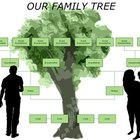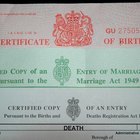
When people talk about death records, they usually mean a death certificate. Occasionally obituaries and last wills are included in the term, since they only come into play when someone dies. These records are most easily obtained for free at or around the time of death, but all can be found years later if you take the time to look and are somewhat flexible on the "for free" qualification.
Searching Death Records at Probate Court
If the person who died left an estate, even a small one, there is a good chance that it passed through probate court when he died. Since probate files are public, they provide a good, free way to review death certificates, wills and sometimes other death records.
Even if a person leaves a will, the assets and property he owns do not magically transfer on his death to his beneficiaries. The estate must pass through probate, a court-supervised process of collecting assets, paying debts and distributing property to beneficiaries. And if the person didn't leave a will, the probate process involves locating his next of kin to whom his property will pass, paying debts then transferring net assets.
Whether a person leaves a will or not, the person shepherding the estate through probate must prove death. That means it is very likely that you will find a copy of the death certificate in the file. If the person left a will, the original will is also one of the early documents in the probate file. You may even find a copy of the obituary there.
To access a probate file, you'll need to find the proper probate court, usually located in the county in which the person lived just before death. Take in the person's name, date of birth and date of death and ask the clerk to locate the file. You can view it for free, or, for a small per-page fee, make copies of documents of interest.
Vital Records
Each jurisdiction maintains a register of birth and death records of its residents. This includes death certificates. If you know or can determine where the person died, you can see whether the jurisdiction maintains an easily searchable, online database of death information. Many states require you to order and pay for the documents in person, by mail or online. For example, in Michigan you can order records in person or by mail from the Michigan Department of Health and Human Services, Vital Records. You can order Michigan death records online through the VitalCheck website. The downside is that these records are not free.
Social Security Death Index
The Social Security Administration has put together a database of people whose deaths were reported to them between about 1962 and 2014, created from its Death Master File. It is called the Social Security Death Index official site. Many American deaths are listed for that time period – so many, in fact, that the Social Security Death Index (SSDI) has been called a national death index for the United States.
While you cannot access this from the SSA website, you can access it free at Genealogy Bank website or Family Search website. While this will confirm a death for you for free, you won't get the death records for free. If you find someone listed whose records you want, you can order a copy of the SS form the person filled out when applying for a SS card for a fee. This may also give you his parents' names and dates of birth.
Related Articles

How Can I Get My Dad's Death Records ...

How to Find a Death Certificate With a ...

How to Find Out If I am the Heir to a ...

How do I Get my Baby's Birth ...

How to Find the Social Security Number ...

How to Find Someone's Date of Death for ...

How to Look Up the Roll Numbers for ...

How to Find Death Records for Mexico

How to Find Someone's Relatives

How to Get the Birth Certificates of ...

How to Find a Deceased's Last Known ...

How to Obtain a Marriage License in Jail

How to Get Certified to Marry Someone ...

How to Find Bank Accounts of Deceased ...

How to Find Your Dad That You Have ...

How to Find a Person in The Netherlands

How to Get a Parent's Birth Certificate

How to Obtain a Death Certificate in ...

How to Write a Letter to Sponsor ...

How do I Find Deceased Relatives for ...
References
Resources
Tips
- Check public libraries for free genealogical resources and death records/indexes. The Cleveland Public Library's Necrology File offers free public access to microfilmed cemetery records and newspaper death notices.
Writer Bio
With a Master's in English, a Master of Fine Arts in Creative Writing, and J.D. from U.C. Berkeley's law school, Teo Spengler is up on education. She splits her home time between San Francisco and France. A perpetual student and frequent teacher, she is also a writer and world traveler. Her work has appeared in numerous online publications including USA Today, Legal Zoom, eHow Business, Livestrong, SF Gate, Arizona Central, Fairmont Houston Chronicle, Navy Federal Credit Union, Pearson, Quicken.com, TurboTax.com, and numerous attorney websites.
Photo Credits
Jupiterimages/Photos.com/Getty Images